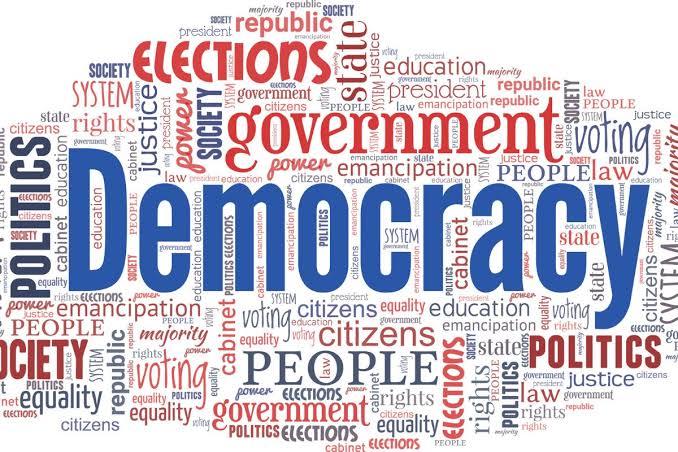Featured
Understanding The Core Principles Of Democracy

By Bayo Osiyemi
Democracy: More Than Just a Word
In a world where the principles of governance shape the destinies of nations, democracy stands as a beacon of hope and empowerment. It’s more than just a word; it’s a system that can transform societies, uphold rights, and give voice to the voiceless. At its heart lies a set of core principles that define its essence and guide its functioning. In this comprehensive guide, we will delve into the fundamental principles that underpin democratic systems, shedding light on how they contribute to the vitality of democratic societies.
Popular Sovereignty: The Power of the People
“We the People” — These three simple words encapsulate the essence of popular sovereignty, a cornerstone of democracy. In a democratic nation, political authority derives from the people’s will. Every citizen’s voice matters, and collectively, they shape the direction of their country. This principle ensures that governments are accountable to the people they serve and decisions are made in the majority’s best interest.
● Key Points:
○ Political authority is derived from the people’s will.
○ Citizens collectively determine the nation’s course.
○ Examples: Referendums, elections, and citizen initiatives.
Political Equality: Every Voice Counts
One person, one vote — A principle that embodies the notion of political equality. In a democratic system, each citizen’s vote holds equal weight, regardless of their background or social status. This principle ensures that no one’s voice is drowned out and that decisions reflect the diverse tapestry of the nation.
● Key Points:
○ Equal representation ensures fair political processes.
○ Voting rights empower citizens to influence governance.
○ Challenges: Voter suppression and unequal access to political participation.
Individual Rights and Freedoms: Safeguarding Liberties
Liberty and justice for all — Democracy guarantees individual rights and freedoms, protecting citizens from potential abuses of power. This includes freedom of speech, assembly, religion, and the right to a fair trial. These rights balance the state’s authority and an individual’s autonomy.
● Key Points:
○ The protection of individual rights is essential in democratic societies.
○ Rights are not absolute; they come with responsibilities.
○ The rule of law ensures rights are upheld impartially.
Rule of Law: Foundation of Fairness
No one is above the law — The rule of law ensures that laws apply equally to all citizens, regardless of their status. It safeguards against arbitrary decisions and fosters a sense of justice and accountability. Without the rule of law, democratic ideals can be eroded and individual freedoms jeopardized.
● Key Points:
○ The rule of law guarantees fairness and impartiality.
○ It prevents abuse of power and promotes accountability.
○ Examples: Independent judiciary and constitutional safeguards.

File photo: Democracy
Transparency and Accountability: Holding Power to Light
Openness breeds trust — Transparency ensures citizens access information about government actions, policies, and decisions. Accountability complements transparency by holding elected officials responsible for their actions. These principles foster trust and prevent corruption.
● Key Points:
○ Transparency strengthens citizen-government relations.
○ Accountability mechanisms include oversight and checks.
○ Challenges: Balancing national security and transparency.
Civil Participation and Civic Education: Power in Participation
Informed citizens, empowered nation — Democratic societies thrive when citizens actively engage in civic life. Participation goes beyond voting; it involves understanding issues, advocating for change, and collaborating to shape policy. Civic education equips individuals with the knowledge they need to be responsible and engaged citizens.
● Key Points:
○ Civic participation includes community involvement and activism.
○ Civic education educates citizens about their rights and responsibilities.
○ Examples: Protests, community initiatives, and town hall meetings.
Pluralism and Tolerance: Embracing Diversity
Unity in diversity — Pluralism accepts and celebrates diverse opinions, cultures, and beliefs. Tolerance ensures that different voices are heard and respected. In a democratic society, embracing diversity enriches public discourse and better decision-making.
● Key Points:
○ Pluralism fosters a rich tapestry of perspectives.
○ Tolerance is essential for social harmony.
○ Challenges: Navigating cultural clashes and hate speech.
Conclusion: The Tapestry of Democracy
Empowering Tomorrow, Today
In the intricate web of democratic governance, each principle is a thread that contributes to the vibrant tapestry of a nation. Popular sovereignty empowers citizens; political equality ensures fairness, and individual rights safeguard freedom. The rule of law creates a just foundation, transparency and accountability strengthen governance, and civil participation drives change. Pluralism and tolerance make room for diverse voices.
As we grasp the essence of these core principles, we empower ourselves as informed citizens. Armed with knowledge, we can actively contribute to shaping the future of our societies. Democracy is more than just a system; it’s a shared journey toward a better tomorrow. So, let’s embrace its principles, champion its ideals, and work collectively for a world where democracy’s light shines bright.
Remember: Democracy isn’t a spectator sport; it’s a call to action, a commitment to principles, and a celebration of the power of “we the people.”
Click to watch our video of the week
Advertise or Publish a Story on EkoHot Blog:
Kindly contact us at ekohotblog@gmail.com. Breaking stories should be sent to the above email and substantiated with pictorial evidence.
Citizen journalists will receive a token as data incentive.
Call or Whatsapp: 0803 561 7233, 0703 414 5611




















